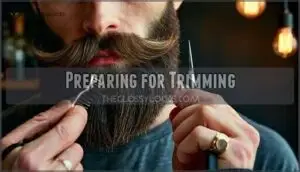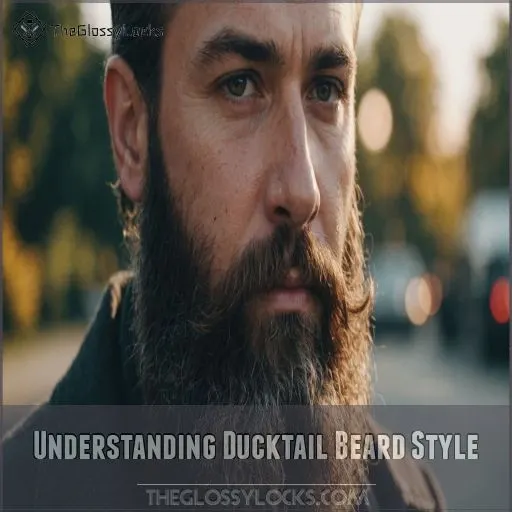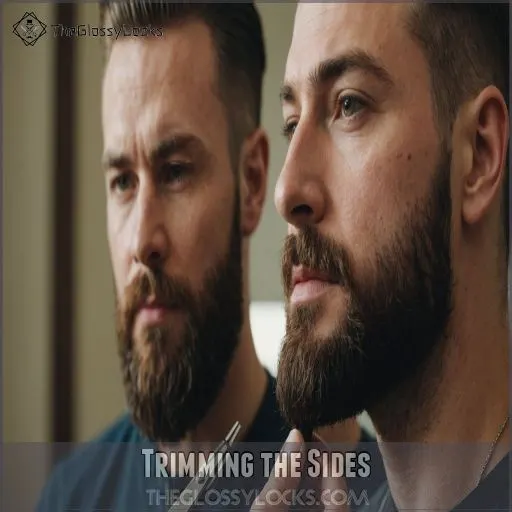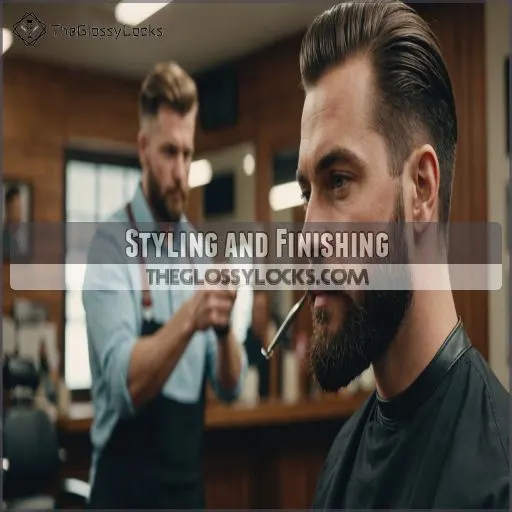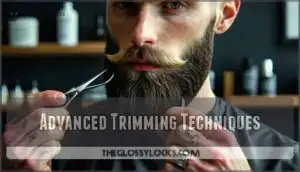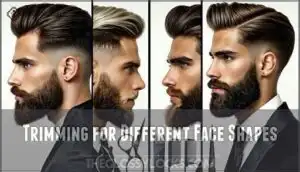This site is supported by our readers. We may earn a commission, at no cost to you, if you purchase through links.
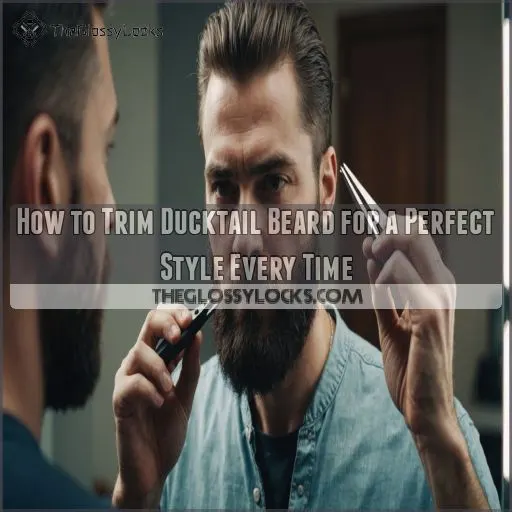
Use a trimming guide to maintain the signature shape: shorter on the sides, longer at the chin.
Begin by tapering the sides, blending seamlessly into your sideburns.
Next, shape the bottom into a point or rounded edge, depending on your preference.
Define the edges along your neckline and jawline for a clean look.
Finally, style with beard balm or wax for that perfect finish.
Take your time, and you’ll be strutting around like a dapper duck in no time!
Table Of Contents
- Key Takeaways
- Preparing for Trimming
- Understanding Ducktail Beard Style
- Trimming the Sides
- Shaping the Bottom
- Defining the Edges
- Styling and Finishing
- Maintaining the Ducktail Beard
- Common Trimming Mistakes
- Advanced Trimming Techniques
- Trimming for Different Face Shapes
- Frequently Asked Questions (FAQs)
- Conclusion
Key Takeaways
- Make sure to wash and condition your beard before trimming; it’s like prepping a canvas before painting. A clean, tangle-free beard makes for a smoother trimming experience, and using beard oil keeps those strands soft and cooperative.
- Use a trimming guide or template to avoid mishaps. Think of it as your beard’s GPS, leading you to achieve that symmetrical, signature ducktail look without ending up in facial hair wilderness.
- Pay attention to your face shape as you trim. Whether you’re chasing a chiseled or rounded look, tailoring your beard to your features will enhance your overall appearance and have you looking sharp as a tack.
- Be patient and trim in small increments. It’s tempting to go full throttle, but think of yourself as sculpting a masterpiece – slow and steady wins the race, ensuring you don’t end up with a Picasso instead of a Rembrandt on your chin.
Preparing for Trimming
Before trimming your Ducktail beard, it’s important to prep your facial forest like a pro by washing, conditioning, and gently combing it to make sure it’s tangle-free.
Imagine your beard as a masterpiece in the making—using a trimming guide and the right tools is like an artist choosing the best canvas and brushes.
Washing and Conditioning the Beard
Start by washing your ducktail beard with a high-quality beard wash formulated to cleanse and nourish facial hair.
Follow up with a moisturizing beard conditioner to keep your strands soft, manageable, and healthy.
Applying a few drops of beard oil or balm will further condition the hair and skin, preparing your beard for the perfect trim and using the right beard trimmer guard.
Drying and Combing the Beard
Now that your beard’s squeaky clean, it’s time to dry and comb it like a pro. Use a soft towel to gently pat dry—don’t rub or you’ll face a frizz frenzy!
- Grab a wide-toothed comb
- Choose a brush for extra shine
- Detangle gently, avoiding snags
- Allow natural air drying
- Master the art of comb choice
Using a Trimming Guide or Template
After drying and combing your beard, grab a trimming guide or template for precision.
Templates come in various types and help achieve symmetry.
Can’t find a commercial one? DIY templates work wonders too!
They help you be accurate, minimizing potential "oops" moments.
A template is your map in beard trends, leading you to the perfect ducktail beard style.
Choosing the Right Trimming Tools
Having the right trimming tools can make or break your ducktail beard.
Avoid a hairy situation with:
- Beard Clippers: For even trimming and defining edges.
- Electric Trimmers: Ideal for quick, precise cuts that streamline your routine.
- Scissors and Combs: Necessary for detail work; choose long scissors and a comb that won’t pull.
Keep these tools handy, and your beard will thank you!
Understanding Ducktail Beard Style
The ducktail beard is a distinctive style that’s both sophisticated and fashionable.
Whether you have a round face or a narrow one, this versatile look can complement your features and help you achieve a confident, polished appearance.
Characteristics of a Ducktail Beard
For trimming your Ducktail beard, first understand its unique character: it’s a full beard with a chic, tapering triangle at the chin—like, to a T, a duck’s tail.
When a hint of sophistication meets beard bravado, you get this style.
Keep it neat with precise shaping tips, great styling products, and dedication to beard maintenance.
Master that chin hair charm.
Face Shapes and Suitability
Face shape‘s your guiding star. Got a round face? Ducktail‘s your ticket to a chiseled chin.
For long faces, consider gently rounding the point.
You’ll balance that handsome mug, and the ladies will note it—just ask Brad Pitt or Jamie Foxx.
Whether you’re square, oval, or triangular, it’s about possibility.
The ducktail’s versatility flatters most shapes.
Variations of the Ducktail Beard Style
Look who’s sporting the Ducktail beard — think Brad Pitt or Charlie Hunnam!
From short Ducktail beards for neatness to braided Ducktails channeling your inner Viking, you’ve got options like intricate beard braids.
Prefer a mustache or goatee? Give it a whirl for added flair.
Just imagine David Beckham’s precision or Leonardo DiCaprio’s sophistication, and you’re on your way!
Trimming the Sides
Trimming the sides of your ducktail beard is important for maintaining its signature tapered look.
With a few simple techniques, you can connect the sides to your sideburns, taper them down to your jawline, and trim the cheeks and mustache area for a seamless, well-groomed appearance.
Connecting the Sides to the Sideburns
With your ducktail beard’s foundation set, connecting the sides to the sideburns is your next port of call.
Picture it like shaping Justin Timberlake’s immaculate facial hair.
Here’s how:
- Match sideburn taper with full beard length using a trimmer.
- Blend sideburn shape seamlessly into beard.
- Laugh when you nail Mel Gibson’s iconic sideburn fade.
Tapering the Sides to the Jawline
After connecting your sides to the sideburns, let’s taper those edges toward the jawline.
Grab your beard clippers and focus on creating a smooth sideburn blend.
This trimming technique shapes the jawline just right, ensuring a clean look when defining your neckline.
Picture it like sculpting a masterpiece—removing unnecessary parts, revealing your face’s natural angles.
Hair growth becomes your canvas—let’s paint perfection!
Trimming the Cheeks and Mustache Area
Trimming your cheeks and mustache is like painting a masterpiece—precision is key.
Set your cheek line, ensuring symmetry, to avoid looking lopsided.
For the mustache, decide on the length that suits your face.
Blend carefully, avoiding razor burn.
If you’re overzealous, it’s not the end of the world—but you might look like a patchy Picasso!
Creating a Seamless Blend
Now that you’ve trimmed the cheeks and mustache, it’s time to blend everything together seamlessly.
Start by connecting the sideburns to the sides of the beard, tapering them down to the jawline.
Gently fade the cheeks into the beard, ensuring a smooth change.
Finally, trim the neckline to create a harmonious, well-groomed look.
With a little finesse, you’ll achieve that signature ducktail style.
Shaping the Bottom
When you’re shaping the bottom of your ducktail beard, think of it as sculpting your masterpiece—you’re the artist, and precision is your paintbrush.
Whether you prefer a bold point or a softer rounded edge, the key is symmetry and connecting the sides seamlessly for a look that’s as sharp as your sense of style.
Trimming the Bottom to the Desired Length
You’ve nailed the sides; it’s time to focus on the bottom.
Use a trimmer to achieve the ducktail length you want, toggling between precision and creativity.
Aim for symmetry control, keeping the bottom width even.
A beard comb is your best friend here, ensuring each hair falls into place like a well-orchestrated symphony.
Ready for finesse?
Creating a Pointed or Rounded Edge
When shaping your ducktail beard, consider the age-old debate: pointed or rounded edge? Here’s a quick guide.
- Use trimming tools or a template for consistent edge length.
- A pointed edge adds flair, like a rockstar’s exclamation point.
- Rounded edges offer a suave, businessman look. Use beard balm to soften and style, ensuring your edge looks sharp—not barbershop hack job.
Connecting the Sides to the Bottom
Once you’ve trimmed the sides, it’s time to focus on the bottom.
Use your trimmer or scissors to gradually taper the hair from the sides into the chin area, creating a seamless connection.
Experiment with different lengths and angles to find the ducktail shape that flatters your face best.
Patience and precision are key for a polished, symmetrical look.
Achieving a Symmetrical Look
Bringing together the sides you’ve trimmed to the bottom, harmony is key, like synchronized swimmers finding rhythm.
Use a beard shaping template and comb to make sure symmetry.
Choosing the right tools makes all the difference.
Picture yourself sculpting a masterpiece, aligning both sides effortlessly.
Stick with subtle adjustments—no bulldozing your beard forest, but rather gentle pruning for a polished look.
Defining the Edges
When you’re trimming your ducktail beard, perfecting the edges is like getting the crisp outlines on your favorite coloring page—essential for that polished finish.
You’ll want to wisely guide your tools, shaping the neckline, jawline, and mustache area to transform your beard into a masterpiece worthy of a second glance.
Trimming the Neckline and Jawline
After shaping the bottom, it’s time to tackle your neckline and jawline with precision.
Aim for:
- Neckline shape: Use a trimmer for a clean line.
- Jawline definition: Fade techniques enhance contours.
- Razor vs. trimmer: Choose your weapon, avoid skin irritation.
Master this, and you’re golden!
Creating a Defined Edge Around the Mouth
Next, you’ll want to define a clean, sharp edge around your mouth. Use small, precise snips with your trimmer to carefully sculpt the lip line, making sure it’s symmetrical and well-defined. This will help create a polished, sophisticated look for your ducktail beard.
Take your time and make small, gradual adjustments to avoid accidentally removing too much hair.
Gently comb the hair in the desired direction and trim along the edge for a clean line.
Step back and examine your work – make any necessary tweaks to make sure both sides match perfectly.
| Tip | Technique |
|---|---|
| Avoid Over-Trimming | Take your time and make small, gradual adjustments to avoid accidentally removing too much hair. |
| Use a Comb as a Guide | Gently comb the hair in the desired direction and trim along the edge for a clean line. |
| Check for Symmetry | Step back and examine your work – make any necessary tweaks to make sure both sides match perfectly. |
Trimming the Mustache and Surrounding Area
A well-groomed mustache can make or break your ducktail beard.
Grab your trimming tools and get ready to shape the mustache to perfection!
Use blending techniques to make sure it harmonizes with your beard like a professional beard fade.
Watch the mustache length—shorter can add neatness, while a longer one adds flair.
Avoiding mistakes here keeps you from looking like a character out of a spaghetti Western!
Refining the Edges for a Polished Look
You’ve done wonders with the mustache, and now it’s time for final touches. Think of refining the edges like framing a masterpiece.
- Trim the neckline and jawline to create smooth lines.
- Sculpt around the cheeks and mouth with precision.
- Make sure both sides match by standing back and checking.
Styling and Finishing
With the right styling and finishing touches, you’ll transform your ducktail beard from unruly to refined in no time.
Whether you’re adding a mustache or goatee, or simply applying beard balm to get that perfect finish, remember that a little attention to detail can really make your beard stand out and show off your personality.
Applying Beard Balm or Wax
Once you’ve trimmed your ducktail to perfection, it’s time to reach for a trusty beard balm or wax.
Gently work a small amount through your facial fuzz, using your fingertips to evenly distribute the product from roots to ends.
This helps tame flyaways, add shine, and keep your ducktail looking sharp all day long.
Styling the Beard to Preference
Styling your Ducktail Beard is like putting the cherry on a sundae. Start shaping the point with a good beard comb.
Dab some beard wax types to hold that masterpiece in place.
Beard oil? It’s your beard’s best buddy, offering shine and softness. Choose your style—sleek or rugged? The right Dufftail beard length and oil benefits add magic.
Adding a Mustache or Goatee
With your beard styled to perfection, let’s explore enhancing your look with a dashing mustache or goatee.
Imagine combining different mustache styles or a classic goatee to create a striking beard combo.
Facial hair can reflect your personality, so play around with grooming tips until you find the style that shouts "master of my own fate," like a ducktail beard!
Finishing Touches for a Complete Look
Adding a mustache or goatee to your ducktail beard can enhance your look even more.
Now, put the cherry on top by grooming like a pro.
Don’t forget those finishing touches:
- Apply beard balm for shine and control.
- Style using a trusty comb for precision.
- Keep a beard maintenance schedule for that impeccable look.
And voilà, you’re looking sharp!
Maintaining the Ducktail Beard
Maintaining your ducktail beard is important for keeping it looking its best.
Regularly trim and groom your beard.
Use nourishing beard oil or balm.
Adjust the style as your facial hair grows.
These simple steps will help you achieve a polished, well-defined ducktail look every time.
Regular Trimming and Grooming
Regular trimming keeps your Ducktail Beard looking sharp and avoids the dreaded "wild bush" stage. Imagine your beard as a prized bonsai—it needs care! Trim once every two weeks.
| Component | Recommended Frequency | Tools Needed |
|---|---|---|
| Sides & Cheeks | Every 2 weeks | Clippers, Scissors |
| Bottom Edges | Every 2 weeks | Clippers |
| Mustache | Weekly | Scissors, Comb |
Keep your styling tools handy, and master your beard care routine like a pro!
Using Beard Oil or Balm for Hydration
Once you’ve conquered trimming, use beard oil or balm like a hydration superhero cape for your beard.
Both offer splendid benefits: oils provide silky nourishment, while balms deliver hold and control.
Choose DIY beard oil if adventurous!
Apply oil frequently to fend off dryness, keeping your ducktail lush and touchable.
It’s like watering your rugged facial garden.
Avoiding Split Ends and Breakage
To dodge split ends and breakage, treat your beard like royalty!
Beard oil benefits can’t be overstated—it keeps hair soft, reducing the brittle effect.
Be picky with your comb; choose one that glides, not tugs.
Mind your trimming frequency—more trims, less frizz!
Pamper that majestic mane!
Adjusting the Style as the Beard Grows
As your ducktail beard grows, it’ll evolve like a living sculpture.
You’ll need to adapt your trimming technique to maintain that iconic shape.
Keep an eye on those growth stages – longer beards might require less frequent trims, but more careful shaping.
Don’t be afraid to tweak your style as your beard length increases.
Common Trimming Mistakes
Even with the best intentions, trimming a ducktail beard can sometimes go awry.
Let’s explore some common pitfalls to avoid, so you can keep your beard looking sharp and stylish without any hair-raising mishaps.
Over-Trimming or Under-Trimming
Maintaining your ducktail beard is a breeze, but watch out for common trimming pitfalls! Over-trimming or under-trimming can throw a wrench in your style. Here’s why you might want to avoid these beard blunders:
- Your confidence takes a hit
- You’ll look like a scruffy mess
- People might mistake you for a lumberjack
- Dating life? What dating life?
- Say goodbye to your suave, sophisticated image
Uneven Edges or Asymmetry
Symmetry is the key to a flawless ducktail beard.
You’ve probably experienced the frustration of uneven edges or asymmetry – it’s like trying to balance a seesaw with one leg!
Don’t worry, though. With a steady hand and a keen eye, you can fix these common blunders.
Use a good mirror, take your time, and remember: it’s easier to trim a little more than to glue hair back on!
Not Using a Trimming Guide or Template
While freehanding might seem cool, it’s a recipe for disaster. Trust me, I’ve been there! Skipping a trimming guide or template is like trying to navigate without a map. You’re bound to get lost in the facial hair wilderness.
Here’s why you should always use a guide:
- Consistent angles
- Symmetrical shaping
- Precise neckline definition
- Foolproof cheek lines
Don’t wing it – let a guide be your beard’s best friend!
Not Trimming in Small Increments
After mastering templates, let’s tackle another common pitfall: overzealous trimming. You’re keen to shape that perfect ducktail, but hold your horses! Trimming too much at once can leave you with an uneven beard or awkward shape. Instead, think of it as sculpting a masterpiece – take it slow and steady.
Here’s a handy guide to keep you on track:
| Trimming Area | Small Increment | Result if Overdone | Tip |
|---|---|---|---|
| Cheeks | 1/8 inch | Patchy beard | Use guard |
| Neckline | 1/4 inch | Beard too short | Start high |
| Chin | 1/2 inch | Beard too long | Taper gradually |
| Mustache | 1/16 inch | Uneven look | Trim dry |
| Sideburns | 1/4 inch | Disconnected style | Blend carefully |
Advanced Trimming Techniques
Ready to take your ducktail beard game to the next level?
In this section, we’ll explore advanced trimming techniques that’ll help you achieve a perfectly styled, head-turning ducktail beard that’ll make even the most seasoned beardsmen green with envy.
Using Scissors or Clippers for Detailing
Now that you’ve mastered the basics, let’s step up your game with some advanced detailing techniques.
Scissors and clippers are your secret weapons for achieving that perfect ducktail look.
Scissors offer precision for snipping stray hairs and fine-tuning your beard’s shape.
Clippers, on the other hand, are great for maintaining overall length and creating clean lines.
Creating a Layered or Textured Look
Taking your ducktail beard to the next level? Let’s explore creating a layered or textured look. This advanced technique adds depth and character to your beard, making it truly one-of-a-kind. Here’s how to achieve that head-turning style:
- Use thinning shears to create subtle layers
- Blend different lengths for a natural fade
- Point-cut the ends for a textured finish
- Incorporate a comb-over style for added sophistication
- Experiment with asymmetrical textures for a unique look
Trimming for a Viking or Braided Style
Venturing into Viking territory? For a braided ducktail beard that’d make Thor jealous, grow your facial mane longer than usual.
Start by sectioning your beard into thirds, then experiment with different braid patterns.
Thick, loose braids exude rugged charm, while tight, intricate ones scream attention to detail.
Don’t forget to work in some beard oil—it’ll keep those strands soft and manageable.
Experimenting With Different Trimming Tools
One size doesn’t fit all for ducktail beard trimming tools. Experimenting with different options can elevate your grooming game.
Consider trying:
- Clippers vs. scissors for precision control
- Trimming guides for consistent shaping
- DIY tools like beard shaping templates
Trimming for Different Face Shapes
Trimming your ducktail beard to complement your face shape is key to achieving a polished, flattering look.
Whether you’ve got a round, square, oval, or long face, we’ll show you how to adjust your trim for a perfectly balanced ducktail that’ll have you looking sharp and stylish.
Trimming for Round or Square Faces
If you’ve got a round or square face, the ducktail beard can be your secret weapon for adding definition. Let’s tailor this style to your unique features:
| Face Shape | Trimming Goal | Key Areas | Styling Tip |
|---|---|---|---|
| Round | Elongate | Chin | Grow longer |
| Round | Define | Cheeks | Trim closer |
| Square | Soften | Jawline | Blend edges |
| Square | Balance | Sides | Keep fuller |
Trimming for Oval or Triangular Faces
For oval or triangular faces, you’ve hit the jackpot with a ducktail beard! This style can enhance your natural features beautifully.
Here’s how to nail it:
- Maintain a longer chin length to balance your face shape
- Keep the sides slightly fuller for added width
- Taper the beard gradually down to the chin
Trimming for Long or Narrow Faces
Having conquered oval and triangular faces, let’s tackle the long and narrow visage. You’ll want to keep your Ducktail beard shorter on the sides and fuller at the bottom to add width. Here’s a quick guide to help you master the art of balance:
| Area | Length | Technique | Goal |
|---|---|---|---|
| Cheeks | Short | Tight trim | Minimize length |
| Sides | Medium | Gradual taper | Create width |
| Chin | Longer | Rounded or squared | Add fullness |
| Neckline | Higher | Clean, defined edge | Shorten face shape |
You’ll want to keep your Ducktail beard shorter on the sides and fuller at the bottom to add width. Here’s a quick guide to help you master the art of balance:
| Area | Length | Technique | Goal |
|---|---|---|---|
| Cheeks | Short | Tight trim | Minimize length |
| Sides | Medium | Gradual taper | Create width |
| Chin | Longer | Rounded or squared | Add fullness |
| Neckline | Higher | Clean, defined edge | Shorten face shape |
Adjusting the Style for a Balanced Look
Achieving a balanced look with your ducktail beard isn’t just about face shape—it’s about creating harmony.
You’ll want to think about your beard’s density and how it impacts your overall appearance.
Play around with different lengths and tapering techniques to find what suits you best.
Don’t be afraid to experiment!
Frequently Asked Questions (FAQs)
How often should I trim my ducktail beard?
Trimming your ducktail beard every two to three weeks keeps it sharp and dapper.
Letting it go too long can turn your masterpiece into a shaggy mess rather than a sleek ducktail.
Stay ahead of the curve!
Can I use regular scissors to trim my ducktail beard?
You can use regular scissors, but it’s like using a butter knife to cut steak—possible, but not ideal.
Opt for high-quality beard scissors or clippers for precise shaping and to avoid any clipping calamities.
How do I prevent ingrown hairs with a ducktail beard?
Dodging ingrown hairs with a ducktail beard is a breeze.
Keep those follicles happy by gently exfoliating your skin regularly, moisturizing with beard oil, and trimming with clean, sharp tools.
Healthy skin, happy beard—smooth sailing ahead!
What are the best beard oils for maintaining a ducktail?
Ah, the secret to a well-tamed ducktail? Reach for a nourishing beard oil that’ll keep your whiskers soft, supple, and oh-so-manageable.
Trust us, your chin will be the talk of the town.
Can I dye or color my ducktail beard?
Coloring your ducktail beard is like painting a masterpiece on your face.
Use a beard-specific dye for the best results.
Test a small area first and follow instructions carefully.
Want that extra flair? Consider consulting a professional.
Conclusion
It’s almost uncanny how, with just a few passionate snips, you can master the art of how to trim ducktail beard like a pro.
You’ve journeyed through washing, shaping, and defining your beard with precision and creativity.
Embrace the impeccable look you’ve crafted, steering clear of common pitfalls.
Whether you’re going for a classic pointed style or a rounded edge, your ducktail beard is now a reflection of your expert grooming skills.
Keep strutting with confidence and dapper flair!

